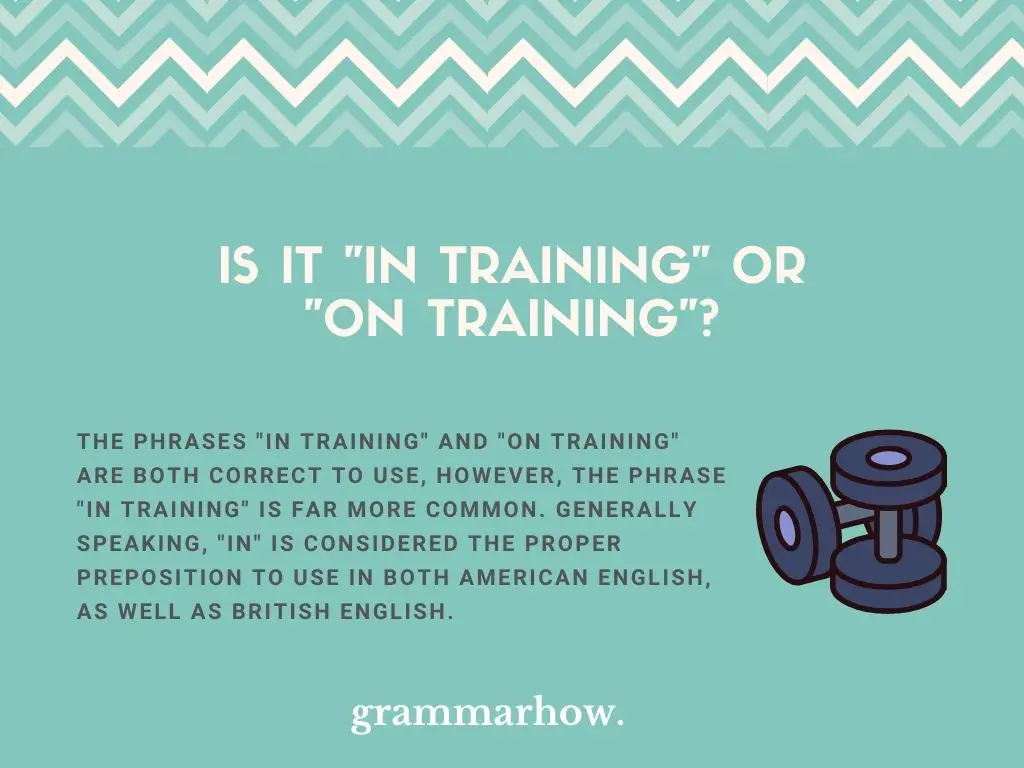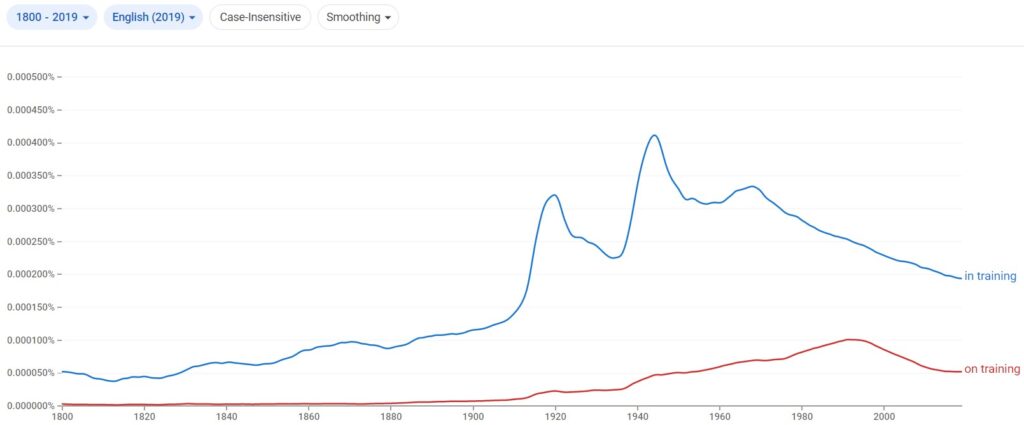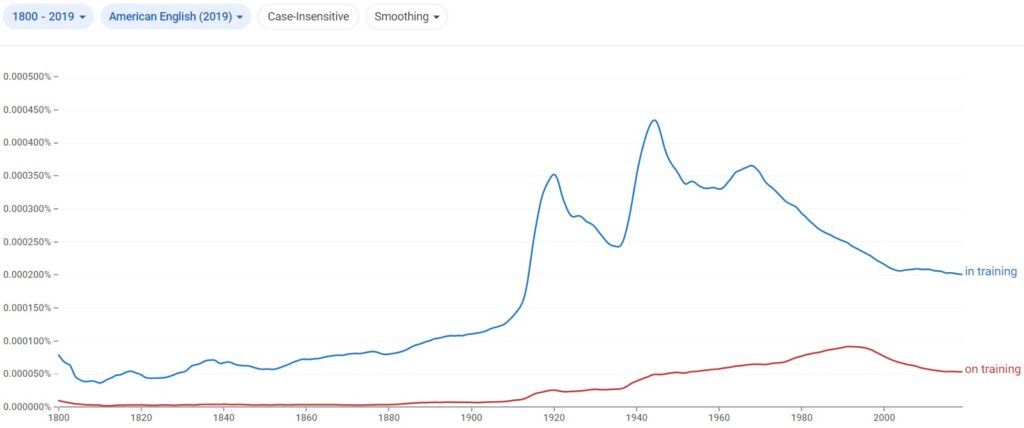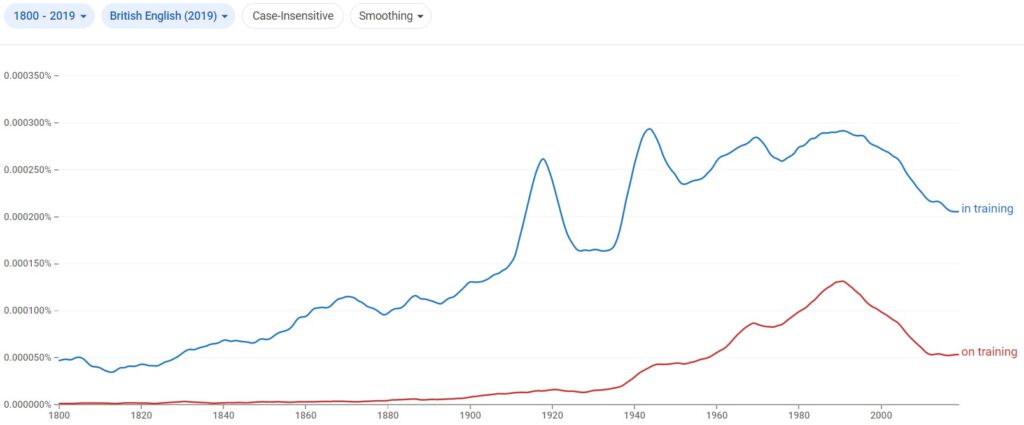The phrases “in training” and “on training” sound like they would be consistent in meaning. While this is somewhat true, the two phrases do carry slightly different meanings, which also affects the overall use of both. This article will take a closer look at both phrases and their appropriate use.
Is It “In Training” Or “On Training”?
The phrases “in training” and “on training” are both correct to use, however, the phrase “in training” is far more common. Generally speaking, “in” is considered the proper preposition to use in both American English, as well as British English.

What Does “In Training” Mean?
When we say that we are “in training”, we mean to express that we are presently attending, receiving, or involved in training sessions or classes. This is because the preposition “in” indicates that a period of time during which an event takes place or a situation remains the case.
Therefore, when we say that we are “in training”, we are depicting the period of time in which the “training” has taken place.
We can now look over the following examples that showcase how the phrase “in training” is properly used:
- I am currently in training to become the company’s new operations manager.
- The entire team is in training for the playoffs, which takes up a good portion of their time.
- To be in training, is to be accurately working or progressing towards a physical goal.
- I am presently in training to become a registered nurse, as my wish is to help others and care for them.
- He is in training for a marathon, which means that his lifestyle and diet have vastly changed.
- I’m on training every day next week, so you will be unable to contact me while I am at work.
What Does “On Training” Mean?
While “on training” is very uncommon, there are some instances where it is an acceptable phrase to use. This is because the term “on” has various meanings and can be used to reflect a different relation to the term “training”.
We can use “on” to indicate the continuation of a task, movement, or action. Therefore, when we say we are “on training”, it shows that we are in the progress of completion. It is important to keep in mind that the phrase “on training” is considered informal and slightly awkward, so it may get misconstrued by your audience.
Here are a few examples that showcase how this phrase can be used, but they are quite contextual:
- I am on training this week, so I may be slightly unreachable.
- I was away on travel for work last week and this week I will be on training.
- I am going on training courses for work over the next month.
- I will be on training this week, so feel free to contact my secretary if you need anything.
- Would you like to come on training excursions with me in Toronto next month?
- Going on training trips with the rest of the company is considered a privilege, so you will have to start consistently showing up on time.
Is “In Training” Or “On Training” Used The Most?
Considering that “on training” is very uncommonly used in the English language, it is clear that “in training” would be the more frequently used and considerably proper phrase. When looking at the data presented by Google Ngram Viewer, we can see that this is certainly the case.

From the 1800s to the present day, there has never been a time that the phrase “on training” was used more often than “in training”. The difference in use between the two phrases is quite substantial, with “in training” is far more common.
Are “In Training” Or “On Training” Used Differently In The UK And The US?
Generally speaking, “in training” and “on training” are used quite consistently in both the UK and the US. When looking at Google Ngram View data on the use in American English and British English, we can see that the differences in use are very similar.
The Google Ngram Viewer for the US shows that the use of “on training” has always been quite minuscule. On the other hand, the use of “in training” is common. The use has fluctuated over time, but regardless, “in training” has consistently been used more often.

In the UK, the Google Ngram Viewer shows that the use of “on training” is also quite minuscule, however, in recent decades, the use of the phrase has been more common than that in American English. “In training” on the other hand, is still vastly more frequent, despite some fluctuation in use.

Is It Ever Correct To Use “Training” Without A Preposition?
The term “training” is a noun and by the rules of the English language, a noun should always follow a preposition. Therefore, the term “training” should always come after a preposition, in order to make an appropriate or proper sentence.
There are many prepositions that the term “training” can follow. We will now go over a few examples that show the different prepositions that we are able to use, aside from “in” and “on”:
- I wanted to talk to you about training – would you be interested?
- Before training starts, I wanted to discuss some issues with you.
- Since training with me, you have consistently improved at your job, which I very much appreciate.
- Without training, you are entirely unable to work in this business.
- Between training sessions, I was wondering if you would like to go out and get a cup of coffee?
- If you are against training with us, then I will have to ask you to leave.

Martin holds a Master’s degree in Finance and International Business. He has six years of experience in professional communication with clients, executives, and colleagues. Furthermore, he has teaching experience from Aarhus University. Martin has been featured as an expert in communication and teaching on Forbes and Shopify. Read more about Martin here.
